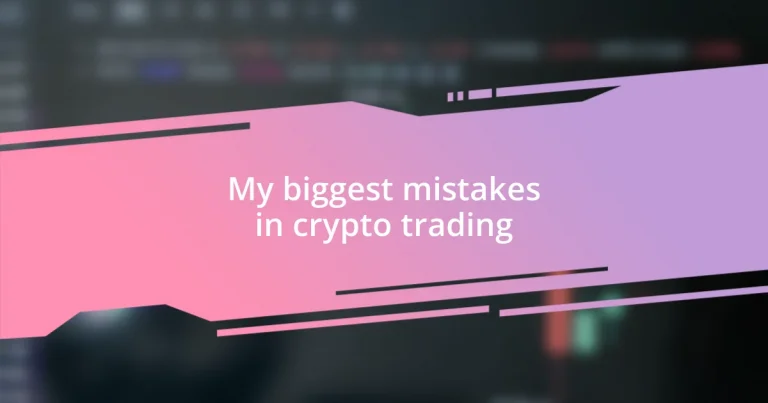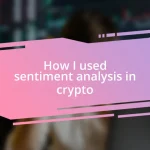Key takeaways:
- Ignoring fundamental analysis and succumbing to FOMO often lead to impulsive and costly trading decisions.
- Emotional decision-making, including overtrading and trading based on pride or fear, can cloud judgment and result in significant losses.
- Learning from past mistakes, maintaining a disciplined approach, and conducting thorough market research are crucial for successful trading in the volatile crypto landscape.
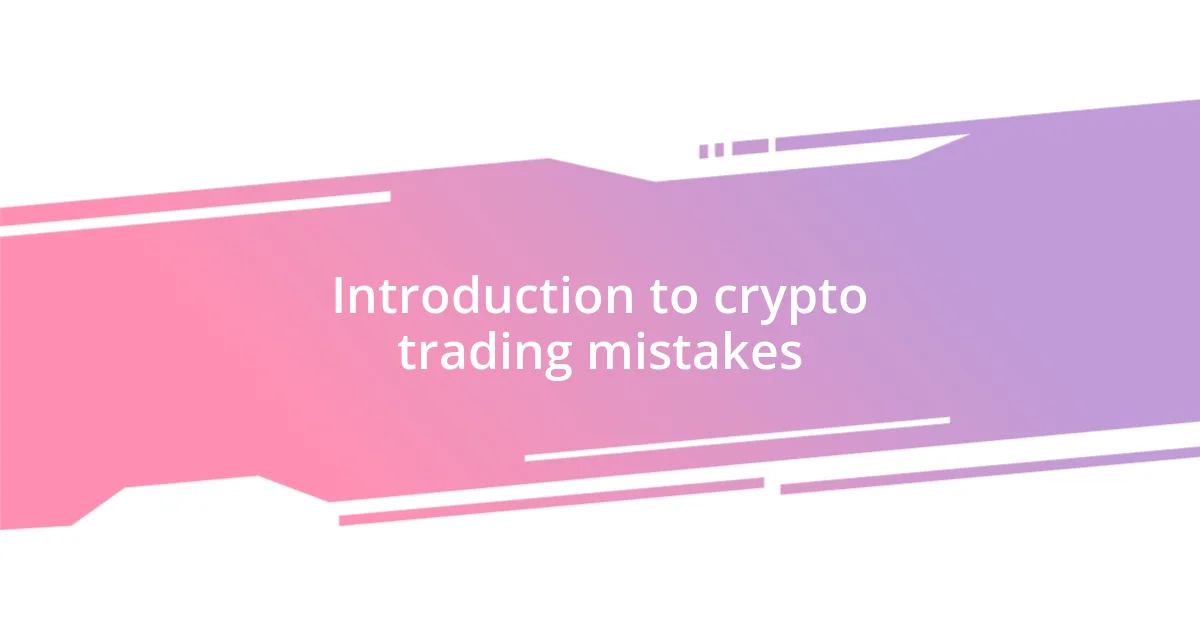
Introduction to crypto trading mistakes
In my early days of crypto trading, I remember feeling invincible after a few small wins. However, it didn’t take long for me to realize how quickly things could turn sour. Reflecting on those moments, I often ask myself, “What did I think would happen when I ignored fundamental analysis?”
One of the biggest mistakes I made was getting swept up in the hype of social media trends. I watched as excitement bubbled around a particular coin and dove in without doing my due diligence. Asking myself, “What could possibly go wrong?” seems naïve now, but that rush was intoxicating, and it taught me the hard way about the dangers of FOMO—fear of missing out.
I’ve found that sharing my mistakes with others not only helps me process my experiences but also resonates with traders who feel isolated in their struggles. We’ve all made decisions we regret; the key is to learn from them together. Consider this: if I had approached trading with a clearer mindset and grounded strategy, how different might my journey have been?
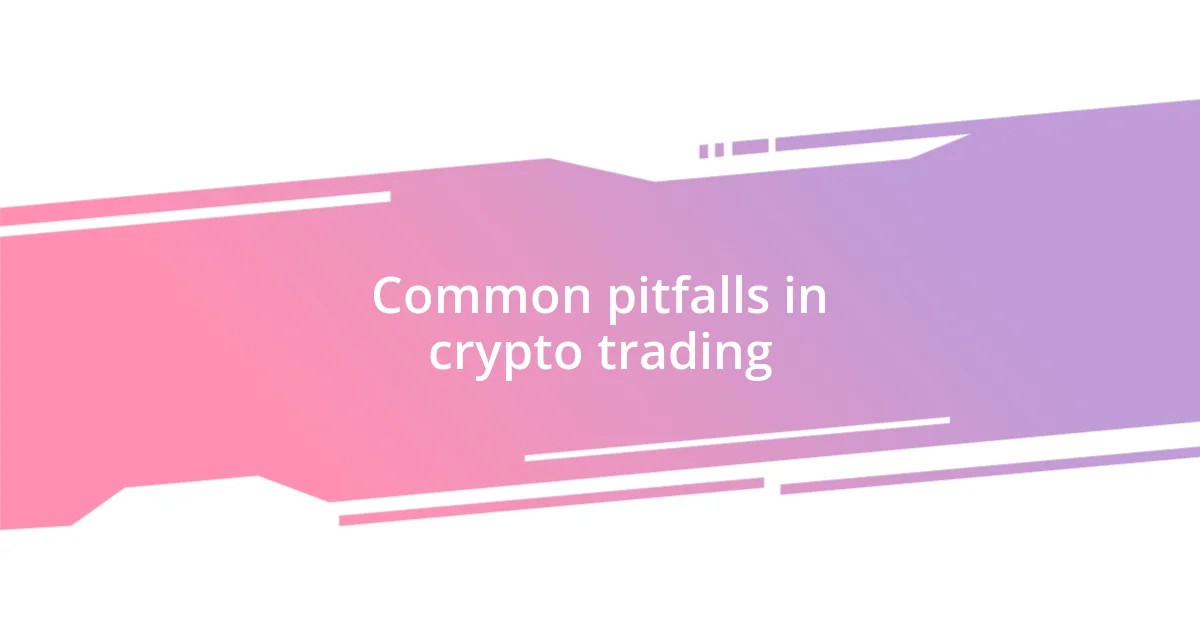
Common pitfalls in crypto trading
Diving into crypto trading, I quickly realized that it’s a slippery slope. One pitfall that caught me off guard was overtrading. In my eagerness to capitalize on every market move, I found myself making impulsive trades, which often led to more losses than gains. It’s fascinating how the desire to be in constant action can cloud judgment, isn’t it?
Here are some common pitfalls to watch out for:
- Chasing losses: Trying to recover lost funds by making riskier trades can lead to even bigger setbacks.
- Ignoring security measures: Underestimating the importance of securing your investments put me at risk of hacks and scams.
- FOMO: Jumping into trending coins without proper research can turn a promising profit into a costly mistake.
- Neglecting tax implications: I learned the hard way that crypto transactions have tax consequences, and failing to track them caused me headaches down the line.
Remembering these moments is crucial; they remind me to approach trading with a more balanced mindset.
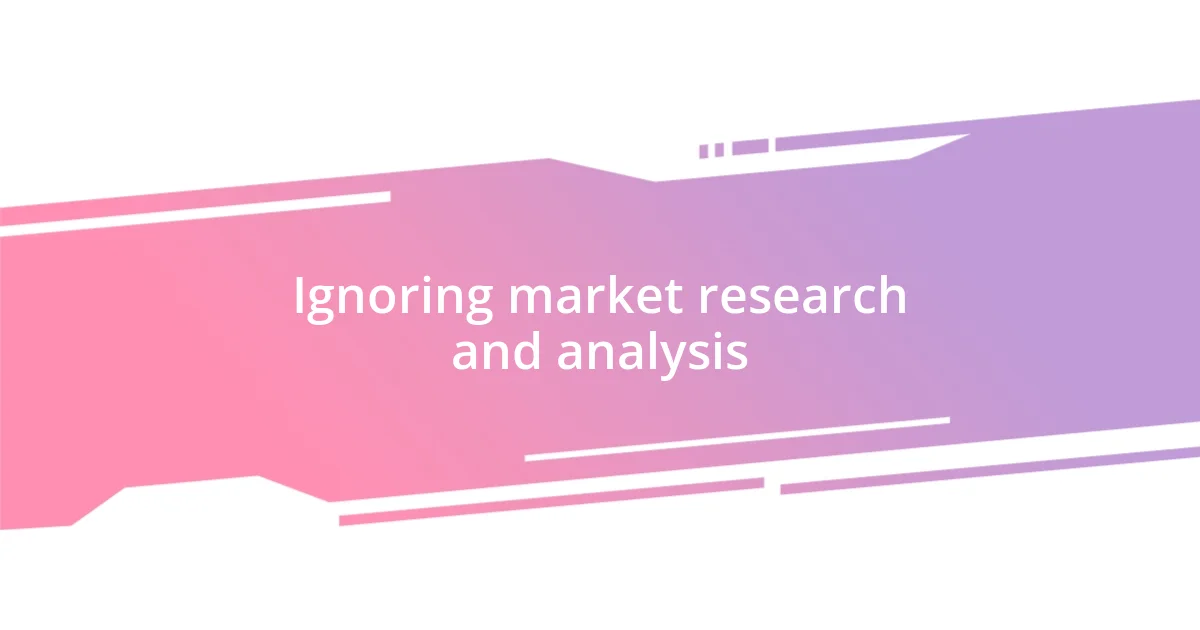
Ignoring market research and analysis
When I think back to my early trading days, it’s hard to overlook how often I neglected the importance of market research and analysis. I often found myself caught up in web forums where speculation ruled, ignoring crucial data points that could have guided my decisions. It’s disheartening to admit, but embracing the nuances of technical and fundamental analysis would have spared me from several costly mistakes.
There was one particular incident that still stings—it involved a coin that everyone was excited about. I didn’t bother to research its fundamentals or examine its price charts. The rush to jump in felt exhilarating at the time, but I ended up losing more money than I’d anticipated. It’s tough to reconcile that feeling of excitement with the harsh reality of my unpreparedness. Learning to analyze the market not only enhances decision-making but also helps cultivate a level of confidence that’s hard to shake off.
The bottom line is that ignoring market research left me vulnerable. Every time I dismissed the importance of a thorough analysis, I paid the price—literally. If I had taken a step back and conducted proper research, I could have avoided those emotional roller coasters. A well-founded strategy backed by informed decisions makes a world of difference in the volatile crypto landscape.
| Aspect | Without Research | With Research |
|---|---|---|
| Price Volatility | High risk of loss | Informed risk management |
| Market Trends | Emotion-driven decisions | Data-driven strategy |
| Confidence Level | Uncertainty and fear | Calculated trading |
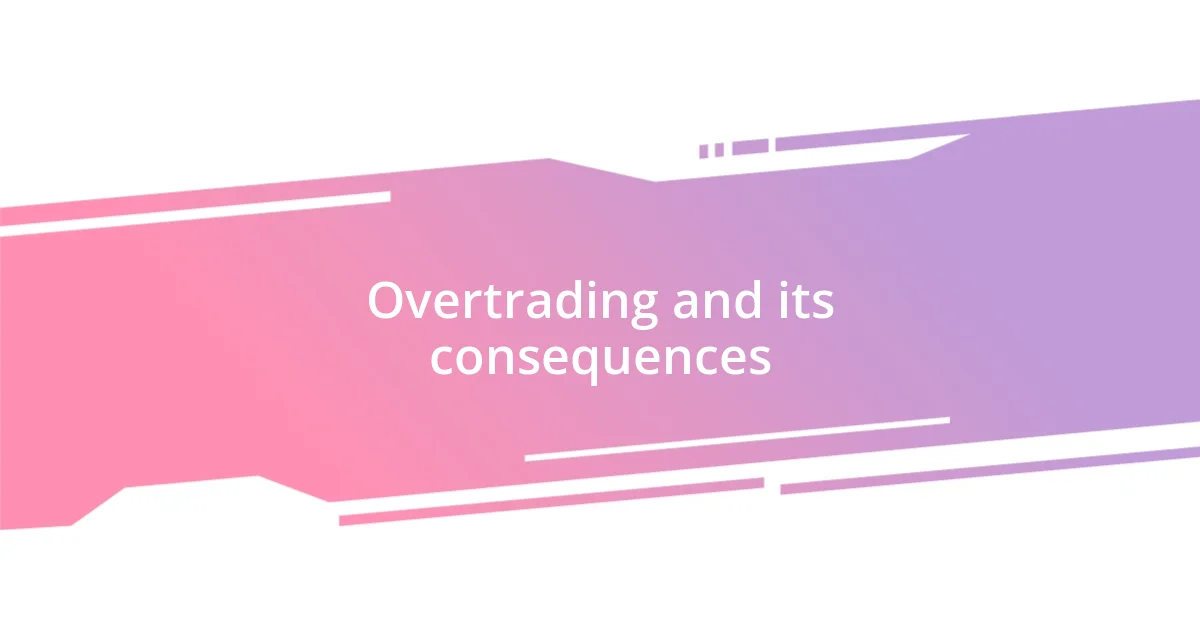
Overtrading and its consequences
Overtrading is a trap many traders, including myself, fall into during the exhilarating highs of the market. I remember a phase when I was checking my screen constantly, as if my wealth was tied to every flicker of the price chart. The rush made me feel alive, but that constant trading often resulted in poor decisions. Isn’t it puzzling how the very drive to stay active can lead to missed opportunities instead?
One day, I found myself buying and selling a popular altcoin multiple times within hours. The initial thrill quickly turned sour as transaction fees piled up and profits evaporated. I had naively thought that being busy ensured success, but instead, I was left questioning my effectiveness as a trader. Reflecting on it now, I realize that patience can be far more profitable than frantic trading.
The consequences of overtrading extend beyond just financial losses. I also noticed a toll on my mental well-being. I often felt stressed and overwhelmed, wrestling with regret over impulsive choices rather than enjoying the trading journey. Have you ever experienced that kind of stress? A calmer and more strategic approach surely would have served me better in the long run. Finding a balance is vital; taking a step back can often reveal more clarity and lead to stronger decision-making.
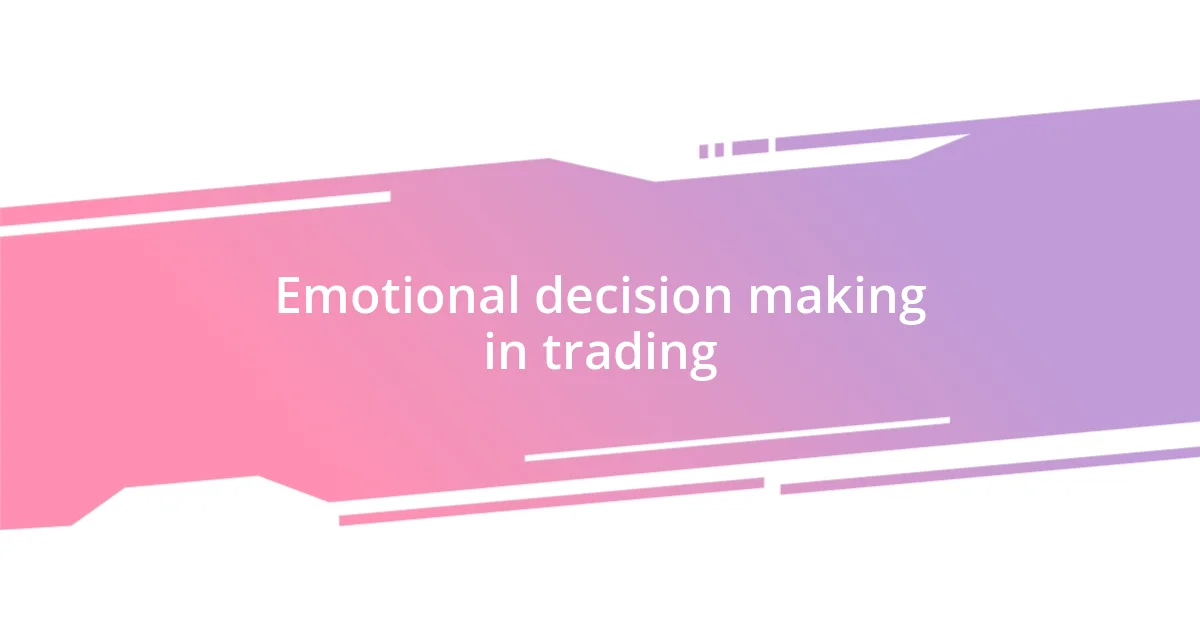
Emotional decision making in trading
Emotional decision-making in trading is something I grappled with early on, and it often clouded my judgment. I remember one instance where I let my fear of missing out (FOMO) push me into a rash investment. The market was buzzing, and instead of taking my time to analyze, I jumped in with both feet. The moment I clicked “buy,” I realized how reckless I’d been, and my heart sank when the price plummeted right after. Isn’t it frustrating how our emotions can lead us astray just when we think we’re making a smart move?
On another occasion, I let my pride take the reins. After a string of successful trades, I felt invincible, convinced I could outsmart the market. I made an impulsive decision to double my investment in a coin whose fundamentals I hadn’t fully vetted, motivated by my previous success rather than sound analysis. That trade ended up being a harsh wake-up call. It’s a reminder that emotions like pride can be just as detrimental as fear. Have you ever found yourself stuck in a similar cycle, fueled by an emotional high?
I’ve come to appreciate the importance of maintaining a cool head in trading. Emotional decisions often lead to regret, while a calm, calculated approach can safeguard against devastating losses. By establishing clear trading rules and sticking to them, I manage to keep my emotions in check. Reflecting on my journey, I’ve noticed that I make much better decisions when I operate from a place of mindfulness rather than impulse. It’s fascinating how transforming the way we react to our feelings can significantly influence trading outcomes.
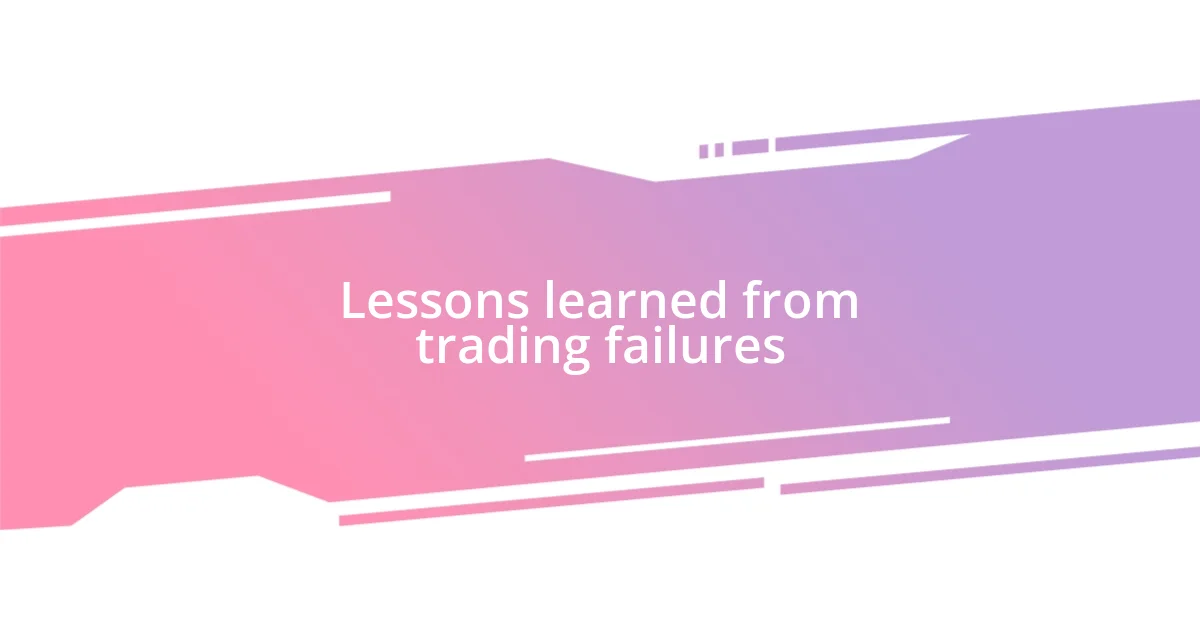
Lessons learned from trading failures
Learning from my trading failures has been a pivotal part of my journey in the crypto market. One time, I invested a considerable sum in a token purely based on hype from social media. I felt a rush of excitement, but as the price quickly tanked, I was left not just with financial losses but a sinking feeling of embarrassment. Have you ever experienced that gut-wrenching moment when your excitement turns to regret? It taught me that solid research and understanding the project behind a coin are far more crucial than jumping on the latest trend.
Another lesson emerged from a poorly timed exit during a major market dip. Instead of holding firm, I panicked and sold my assets at a loss, convinced that the market would only go lower. Later, I observed how those very moments can be when true investors build their portfolios. I’ve learned the hard way that a resilient mindset, especially during downturns, is essential. Isn’t it interesting how our instinct to protect ourselves can lead to missed opportunities?
Reflecting on my trading mistakes serves as a reminder of how crucial it is to embrace a learning mindset. Each failure unfolds new layers of understanding, nudging me toward a more disciplined approach. Growth often comes from adversity, and recognizing that I could learn from my past missteps has been incredibly empowering. It’s a journey, don’t you think? Each setback holds a lesson waiting to be uncovered, guiding us towards wiser trading in the future.












